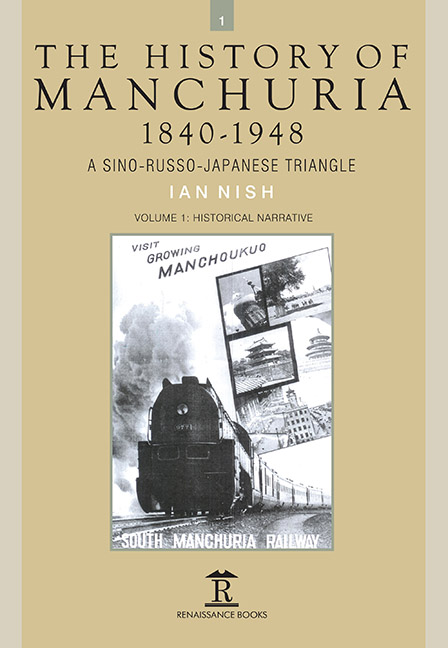Book contents
- Frontmatter
- Dedication
- Contents
- Preface
- Acknowledgements
- Name Conventions
- List of Abbreviations
- List of Maps
- Chapter One Manchuria and Russian Ambition, 1840s–1890s
- Chapter Two Sino-Japanese War and After, 1894–1900
- Chapter Three Prelude to the Russo-Japanese War, 1900–1905
- Chapter Four Railways, Reforms and Revolutions, 1906–1914
- Chapter Five Wartime Turmoil in Manchuria, 1915–1922
- Chapter Six Chang Tso-Lin’s Manchuria, 1922–28
- Chapter Seven Chinese Nationalism and Foreign Railways, 1929–1931
- Chapter Eight Lytton Commission in Manchuria, 1931–1932
- Chapter Nine Manchukuo: From Republic to Empire, 1933–1937
- Chapter Ten A Decade of Wars, 1938–1948
- Epilogue
- Map
- Select Bibliography
- Index
- Volume 2: Select Primary Sources
- Miscellaneous Frontmatter
- Dedication
- Miscellaneous Frontmatter
- Chapter 1 1840–1894
- Chapter 2 1895–1899
- Chapter 3 1900–1905
- Chapter 4 1905–1914
- Chapter 5 1915–1922
- Chapter 6 1922–1928
- Chapter 7 1929–1931
- Chapter 8 1931–1932
- Chapter 9 1933–1937
- Chapter 10 1938–1948
- Apendix Appeal by the Chinese Government
Chapter 5 - 1915–1922
Published online by Cambridge University Press: 18 November 2023
- Frontmatter
- Dedication
- Contents
- Preface
- Acknowledgements
- Name Conventions
- List of Abbreviations
- List of Maps
- Chapter One Manchuria and Russian Ambition, 1840s–1890s
- Chapter Two Sino-Japanese War and After, 1894–1900
- Chapter Three Prelude to the Russo-Japanese War, 1900–1905
- Chapter Four Railways, Reforms and Revolutions, 1906–1914
- Chapter Five Wartime Turmoil in Manchuria, 1915–1922
- Chapter Six Chang Tso-Lin’s Manchuria, 1922–28
- Chapter Seven Chinese Nationalism and Foreign Railways, 1929–1931
- Chapter Eight Lytton Commission in Manchuria, 1931–1932
- Chapter Nine Manchukuo: From Republic to Empire, 1933–1937
- Chapter Ten A Decade of Wars, 1938–1948
- Epilogue
- Map
- Select Bibliography
- Index
- Volume 2: Select Primary Sources
- Miscellaneous Frontmatter
- Dedication
- Miscellaneous Frontmatter
- Chapter 1 1840–1894
- Chapter 2 1895–1899
- Chapter 3 1900–1905
- Chapter 4 1905–1914
- Chapter 5 1915–1922
- Chapter 6 1922–1928
- Chapter 7 1929–1931
- Chapter 8 1931–1932
- Chapter 9 1933–1937
- Chapter 10 1938–1948
- Apendix Appeal by the Chinese Government
Summary
ART. 1.—THE CHINESE Central Government shall employ influential Japanese as advisers in political, financial and military affairs.
Art. 2.—Japanese hospitals, churches and schools in the interior of China shall be granted the right of owning land.
Art. 3.—Inasmuch as the Japanese Government and the Chinese Government have had many cases of dispute between Japanese and Chinese police which caused no little misunderstanding, it is for that reason necessary that the police departments of important places (in China) shall be jointly administered by Japanese and numerous Japanese and Chinese or that the police department of these places shall employ numerous Japanese, so that they may at the same time help to plan for the improvement of the Chinese Police Service.
Art. 4.—China shall purchase from Japan a fixed amount of munitions of war (say 50% or more of what is needed by the Chinese Government) or there shall be established in China a Sino-Japanese jointly worked arsenal. Japanese technical experts are to be employed and Japanese material to be purchased.
Art. 5.—China agrees to grant to Japan the right of constructing a railway connecting Wuchang with Kiukiang and Nanchang, another line between Nanchang and Hangchow, and another between Nanchang and Chaochow.
Art. 6.—If China needs foreign capital to work mines, build railways and construct harbour-works (including dockyards) in the Province of Fukien, Japan shall be first consulted.
Art. 7.—China agrees that Japanese subjects shall have the right of missionary propaganda in China
Japanese military attitudes during negotiations (British intercept)
[Author’s Note: The following was enclosed in a letter from Jordan to the British Foreign Office in April 1915, and purported to be a letter from the Japanese general staff to the military and naval personnel of the Japanese legation in Peking discussing the negotiations with China arising from the ‘Twenty-one Demands’. It is not certain whether it is genuine but it seems to fit in with the attitude of the general staff and of the minister of war in 1915. Grey considered it of sufficient interest to show it to his cabinet colleagues.]
- Type
- Chapter
- Information
- The History of Manchuria, 1840-1948A Sino-Russo-Japanese Triangle, pp. 74 - 84Publisher: Amsterdam University PressPrint publication year: 2016

